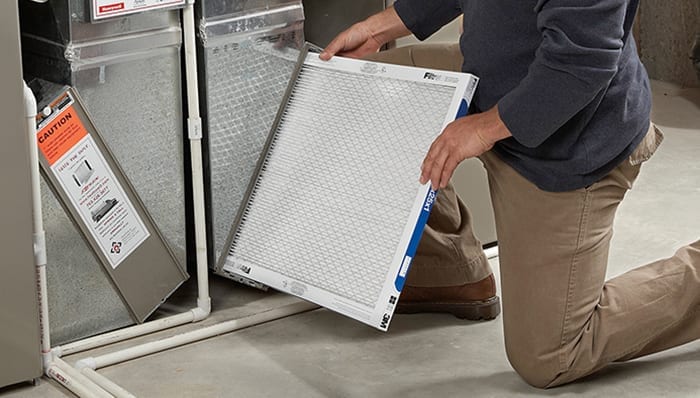[vc_row][vc_column][vc_single_image image=”1597″ img_size=”large”][/vc_column][/vc_row][vc_row][vc_column][vc_column_text]With the start of fall and the end of summer temperatures, it’s important to start preparing your home for the seasonal change. With your home’s indoor air averaging a higher level of pollutants than outdoor air, changing your air filter is one of the more important aspects of autumn preparation. Since your air filters work behind the scenes, it is far too easy to overlook them, but with regular maintenance, you can improve your air quality, lower your energy bill, and keep your unit running efficiently.
How Do Air Filters Help My Home?
In order to keep your indoor climate comfortable, air is constantly moving through your system. Air is first pulled from inside your living space through the return ductwork, conditioned in the unit, and finally passed through an air filter before it re-enters your living space through your supply ductwork. Air filters main function is to catch dust, dirt, debris, allergens, and contaminants in your air before it is sent back into your home.
By removing these contaminants, you receive cleaner, healthier air and help your system run more efficiently. A dirty filter restricts air flow through your system, causing it to work much harder. This continued wear and tear can create issues that require repair and shorten the lifespan of your system. Additionally, an efficient system can lower your energy consumption by 5-10%, lowering your monthly energy bill.
How Often Should I Change My Air Filter?
Standard fiberglass filters should be changed or washed every 30 day and more advanced allergen filters should be changed every 90 days. However, there are several other factors that determine when it’s time to change your filter.
Season
During the extreme heating or cooling months, your system will be working harder to maintain your indoor temperature and require a more frequent air filter change. For summer and winter then, you should check your filter more often to ensure it’s still clean.
Pets
If you and your family own pets, then your air filter will need to be changed more regularly. The high concentration of pet hair and dander circulating through the air can easily get trapped in your air filter. Seasonal temperatures will also impact the amount of pet hair and dander considering that animals tend to shed more in the hotter, summer months.
Allergens
For the spring of 2016, Central Kentucky was named as the 4th most challenging place to live with spring allergies in the United States. it is important to be able to reduce these in your home, especially if someone in your family suffers from asthma, allergies, or other respiratory problems. By upgrading your filter, you can remove up to 50 times more allergens from the air in your home.
Type of Filter
The type of filter that your system requires is one of the main factors for how often you should change your filter. There is a large variation in filters from the materials they’re made with, the thickness of the filter, their form, and other variations. When you purchase a new filter, the manufacturer will include a recommended time to change the filter. Using this recommendation as a base, is a good way to start determining how regularly you should change your filter.
For more tips and information or for help changing your air filter, call Fayette Heating & Air today at 859-203-4602.[/vc_column_text][/vc_column][/vc_row]


 Skip to content
Skip to content








